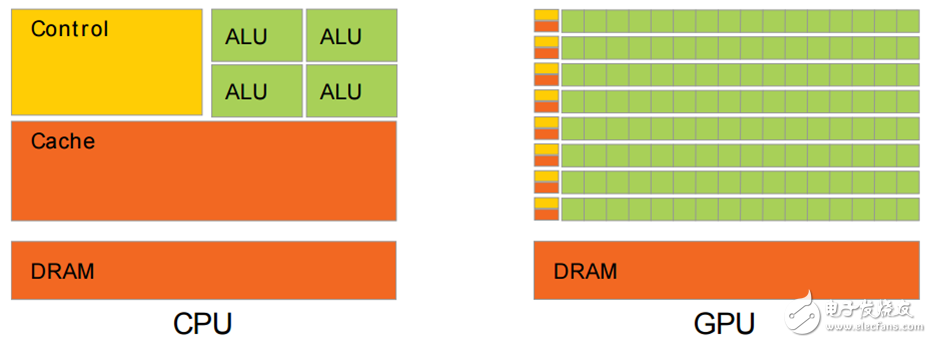The following figure compares the logical architecture in the CPU and GPU. Which Control is the controller, ALU arithmetic logic unit, Cache is the cpu internal cache, DRAM is the memory. It can be seen that GPU designers use more transistors as execution units than as complex control units and caches as CPUs. From a practical point of view, 5% of CPU chip space is ALU, and 40% of GPU space is ALU. This is also the reason for the superior GPU computing power. Someone said that why the CPU is not designed like the gpu, so the computing power is also powerful! why? The CPU is very generic. The CPU needs to support both parallel and serial operations at the same time. It needs a lot of versatility to handle a variety of different data types. At the same time, it must support complicated and general logic judgments. This will introduce a large number of branch jumps and interrupt handling. . All of these make the internal structure of the CPU extremely complicated and the proportion of the computing unit is reduced. The GPU is faced with highly-typed, non-dependent, large-scale data and a clean computing environment that does not need to be interrupted. Therefore, the GPU chip is much simpler than the CPU chip. For example, suppose there is a pile of the same task of addition, subtraction, multiplication, division and calculation. It is OK to hand over this task to a bunch of dozens of pupils. The pupils here are similar to GPU computing units, but they have some complex logic. Reasoning and other issues, such as formulaic derivation, scientific writing, and other highly logical tasks, are clearly inappropriate for primary school students. At this time, university professors are more suitable. The university professor here is the CPU's calculation unit, and university professors can certainly handle addition and subtraction. The problem of multiplication and division is that the single professor's calculation of addition, subtraction, multiplication, and division is faster than that of a single primary school student, but the cost is obviously much higher. Optoelectronic Information Series Photoelectric information series laboratory related equipment Optoelectronic Information Product,Optical Bench Experiments Physics,Optical Devices Physics,Optical Physics Properties Yuheng Optics Co., Ltd.(Changchun) , https://www.yhenoptics.com